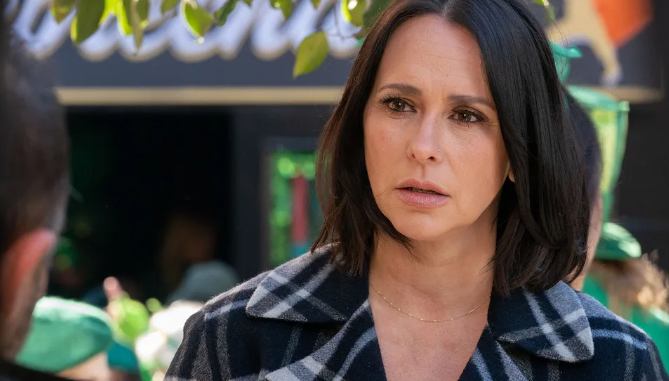
“9-1-1” returned from its mid-season hiatus last Monday, and this week’s episode featured the long-awaited return of Jennifer Love Hewitt to Season 5 of the Fox first responder drama. In the episode, viewers learned where Maddie (Hewitt) had been all this time and why she hadn’t been home to Chimney (Kenneth Choi) and their daughter Jee-Yun. It turns out Maddie had attempted suicide by drowning herself in the ocean during a bout of postpartum depression, which was exacerbated when Jee nearly drowned in the bathtub while Maddie fell asleep. While in the surf, something prevented Maddie from carrying out her attempt, and she ended up traveling to Boston to be admitted to the hospital where she trained as a nurse. After days of testing, it was discovered that Maddie actually had postpartum thyroiditis, and with hormone treatments and outpatient therapy, she was expected to recover. Cut to six months later, Maddie is in a much better place and almost ready to return home to L.A., though still terrified to do so, when she runs into Chimney—who spent months on the road with Jee looking for Maddie—while the two are trying to help injured people on the streets of Boston on St. Patrick’s Day.
Variety spoke with Hewitt about returning to the show after her real-life maternity leave, Maddie’s reunion with Chimney and their daughter Jee-Yun, and Maddie’s future in the second half of “9-1-1” Season 5. “I have this weird little pocket in my body where Maddie sits emotionally, and it’s a very full place because of everything she’s been through. So I just focused on that. For me, I just wanted to look badass visually. And I think I did that. But I wanted it to look that way. I didn’t want it to look like the TV show version of someone who’s about to do that. Even in the Big Bear storyline where she’s fighting for her life against her ex-husband, she still has that determination and that ferocity that I always tried to keep. And in this film, I wanted that to be gone. So the one thing we talked about was really seeing someone who’s tired and worn out by themselves and replaying their life story. And the idea that I’m going to go out there as quickly as possible and be determined not to let her be here anymore. We didn’t really talk about the part where she changes her mind. I know that’s part of it, but we didn’t really discuss that.
And then we went out into the water, and because it took a while to film, as we got out there, the waves started getting bigger and bigger. And I love watching the ocean, but I’m not someone who’s like, “Hey, let me jump into the waves and let them beat me to a pulp in the middle of the day.” So as the waves got stronger and stronger, for me personally, it started getting scarier. And I had a safety guy with me who would pick me up or push me under these huge waves. The idea was that I would go under the water and just stay there for a second. And I did, and then something happened when it happened, and the camera guy kept going, so I kept going. And we just played that moment of her changing her mind. I haven’t actually seen the final cut, so I don’t even know if there’s still that scene of her changing her mind. But that’s what we did. And we only shot that whole scene twice. But it was really weird. I was frustrated knowing that I was going to go out there that day to do that, and then thinking about where people are when they get to that moment. And knowing that there are so many people out there who do, I really took it very seriously and thought about them in that moment and then found strength in her changing her mind.
Ultimately, we got to the point where what brought Maddie home was forgiveness from her daughter. And in that scene, when she remembers her grandmother and reaches out to her grandmother, that was really important to us because, ultimately, Maddie’s story is about her dealing with years and years and years of all kinds of trauma. And she really needs to get out of her own life to heal. But it’s also about, how you, as a grown woman, make mistakes as a mother and then have someone who doesn’t know how to forgive, forgive you for that so you can move forward. That’s a really hard thing to do in parent-child relationships all the time. I’ve looked at my kids a thousand times when they were kids and said, “Oh my gosh, you’re not as great as you want to be today,” or, “You’ve got stitches and there’s nothing I can do about it.” And you look to them, just please tell me you’ll forgive me or you won’t be talking about this therapy when you’re 35. And the truth is, they can’t give you that because they’re not old enough. But what they can give